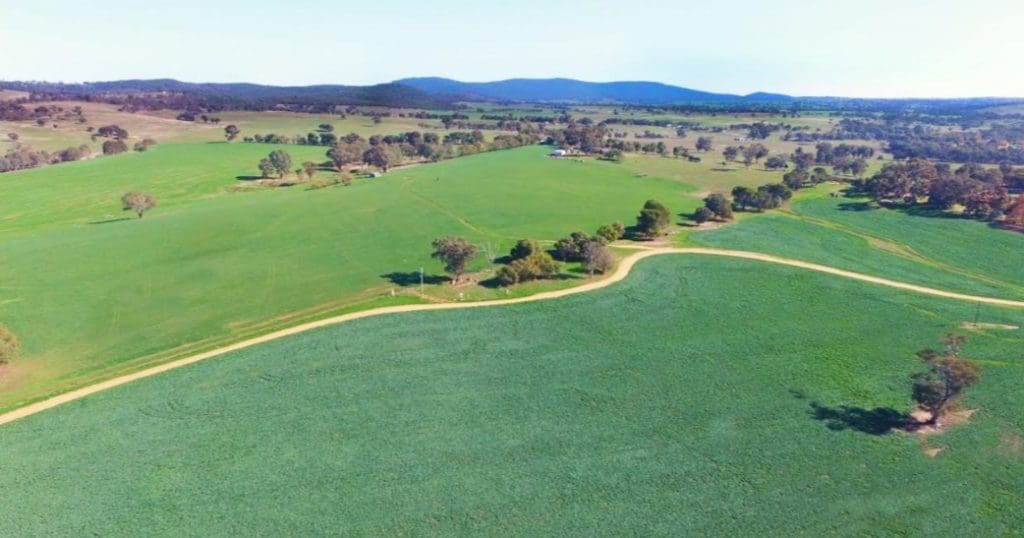
WITH property listings easing and competition slowing, this week’s review looks at some mid-year predictions for rural property demand, trends and prices.
This week in Melbourne, CBRE Agribusiness director Matt Childs and PwC’s Jaclyn Hope addressed the issue at the Australian Agribusiness Farmland Values networking event.
Mr Childs said nationwide, quality agricultural assets are continuing to perform well.
“Compared to previous years, the volume of competition is lower, but A-grade and turnkey assets have strong appeal and are attracting good competition from qualified buyers.”
Mr Childs said the point of difference is that poorer-grade assets are having trouble transacting.
“Two years ago, the gap between ‘good’ and ‘poor’ assets was narrow.
“That has now widened because a portion of the market is sitting on its hands waiting for the right property to come along.”
Mr Childs said today, buyers are compromising less.
“In recent years, when the property market was aggressive and competitive, some buyers were compromising more than they should.”
“Now, buyers are more patient about property purchases and consider whether it is suitable for their existing enterprise or business model.”
Mr Childs said there is currently a low supply of properties and a backlog of buyers, unable to secure an asset, ready to transact.
“These producers may have previously competed for a hotly contested opportunity and missed out during a period of record low supply, or they just haven’t found the right place.”
Mr Childs said many producers have never been in a better position to buy land and a less competitive market gives buyers a better opportunity to secure the right asset.
“In the last two or three years, some vendors achieved better prices than expected. Now with a reduced volume of buyer competition, the market has returned to normality.
“The same level of capital growth is unlikely to be experienced in the coming 12 to 24 months.”
Interest rates and commodity prices underpin reduced competition
Mr Childs said existing primary producers have experienced two or three very good seasons, record levels of capital growth and so, from a balance sheet perspective, they are in a good position to acquire more land.
“On the flip side, rising interest rates and falling commodity prices are being carefully considered and are ruling some potential purchasers out.
“That explains the reduced level of competition.”
Mr Childs said buyers won’t focus on the coming season, the investment will be a long-term play.
“Despite a challenging economic environment (high inflation, rising interest rates, softening commodity prices and strong indications of a possible El Nino), if producers are in a strong financial position and the right property becomes available, they will consider the acquisition.”
Jaclyn Hope is a partner in PwC’s mergers and acquisitions team, with a specific focus on the food and agribusiness sector.
She said producers, particularly on the east coast, have had three great seasons and built significant cash reserves – reflected by record high farm management deposits (FMD) balances of circa $6 billion.
“Many farmers are cashed up and are in buy mode.
“There is no doubt this would be currently offsetting or assisting conversations with their bankers around access to new debt.”
Ms Hope said the market has seen and expects to continue to see, strong interest and strong valuations for good quality agri-farmland assets.
“Australian agribusinesses are no stranger to adjusting operations to cater for economic, market and seasonal dynamics.
“For instance, for beef and sheep producers, there will be an increased focus on stocking levels and profitability analysis around feedlotting and finishing.”
Good enquiry from domestic and foreign investors
Ms Hope said agri-investors are unique in the way they look ‘through-the-cycle’ and take a longer-term view when making investments.
She identified three buyer profiles:
Large family farming groups – there has been an increase of sizeable family farm operators behaving more like corporate investors.
Corporate / Institutional – seeking large scale, asset-backed agribusinesses with strong cashflows.
Private equity – while this group has more of a post farm-gate focus, it also has an appetite for integrated agribusinesses.
Depending on the asset or opportunity, Ms Hope reports strong enquiry from all buyer groups.
“All sectors up and down the agriculture supply chain are showing good enquiry including a good mix of domestic and foreign investors.”
“High quality grazing and grain properties command the most attention and demand for those assets should continue for the remainder of the year.”
“Vertically integrated operations are also attracting a premium driven by scale, margin capture and risk management.”
Like Ms Hope, Mr Childs operates in a market with institutions, corporates, high net worths and wealthy farming families.
“Many foreign and domestic investors are currently seeking opportunities to deploy funds into Australian agricultural assets.”
More property listings expected this Spring
Mr Childs believes more properties will be listed this Spring than the two previous years.
“Producers have been reluctant to sell due to a string of good seasons, high commodity prices, exceptionally low interest rates and historically high capital growth.
“With the tables turning, landowners are now considering their options.”

HAVE YOUR SAY